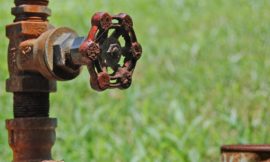My guest this week is Jared Boehs. Jared is the CEO of HyQ Technologies, an Oklahoma-based company focused on recycling oilfield produced water into distilled water and other valuable by-products for beneficial reuse. Jared is also a certified mineral manager and helps property owners with operator negotiations. In this conversation, Jared shares the amazing opportunities around water that is produced as a by-product of oil and gas activity.
Be sure to also subscribe on Apple Podcasts via the link above and please leave us an honest rating and review. We read every one of them and sincerely appreciate any feedback you have. To ask us a question to be featured on an upcoming episode, please leave a comment below or send an email to feedback@mineralrightspodcast.com.
About Jared Boehs
Jared is the CEO of HyQ Technologies, an Oklahoma-based company focused on recycling oilfield produced water into distilled water and other valuable by-products for beneficial reuse. With Boehs, HyQ has devoted itself to reclaiming wastewater and providing an essential and sustainable solution to the produced water crisis facing the oil and gas industry.
Boehs began his career as a field landman, transitioned to operating a lease brokerage firm, and then served as the land manager for a small independent company. Throughout his career, Boehs gained crucial experience drilling wells in Oklahoma and managing minerals across the U.S.
Boehs earned his Bachelor of Science in Agricultural Economics with a minor in Finance from Oklahoma State University. He has obtained certification as a Certified Professional Landman (CPL) through the American Association of Professional Landmen and accreditation as a professional level Certified Minerals Manager (CMM) through the National Association of Royalty Owners (NARO).
Boehs’ deep understanding of the industry, coupled with 22 years in production agriculture, provide a unique perspective on produced water management and the vital role it will play in the future of oil and gas.
We Discuss
Introduction
- Before we dive in, let’s talk a little about your background. Where did you grow up and where did you go to school?
- So in addition to your involvement in the oil and gas industry, I understand you have a background in agriculture and family farming and ranching. How long has your family been farmers/ranchers?
- Is that what originally interested you in mineral rights or how did you decide to get involved as a landman in oil and gas?
Produced Water Opportunities
I wanted to have you on to discuss an important topic related to oil and gas development that many royalty and mineral owners may not realize and that is how much produced water can affect the economics and operations of oil and gas wells.
So we met on the national board of the National Association of Royalty Owners and you gave a really interesting presentation on produced water and recycling that I wanted to dig into.
- For our listeners who might not be aware, how much water is produced as a byproduct of oil and gas production each year? [link to report on groundwater protection council]
- Before we dive into the details, what are some of the uses for produced water? And can operators easily reuse it as-is or does it take some work to get it to a certain point to where it can be re-used or injected underground through a disposal well?
- What methods are used to treat produced water so that it can be re-used?
- I know that it can vary greatly by formation and by basin but to give folks a feel for things, how much water does it take to hydraulically frac a modern horizontal well?
Water Recycling
- What is produced water recycling?
- How costly is it to dispose of produced water and in some cases is it actually cheaper for them to treat and recycle it?
- How much of the water used in frac’ing a well gets produced during flowback and do operators continue to re-cycle this “produced” water over and over again?
- How effective is treating produced water in most basins and are there some basins or plays that are better suited for recycling than others?
How Can Landowners Benefit from Produced Water Recycling
- How can landowners benefit from produced water recycling? If someone is a farmer or rancher and uses water for irrigation or for livestock, can the water be treated to where the surface owner could use some of it? Is this common?
- What about on the other end of the spectrum, can water that has a high concentration of total dissolved solids or of particular elements also be useful or valuable? [e.g. lithium, potash, other minerals]
Let’s talk about some actionable advice for our listeners. Some of the most common events in the lifecycle of owning mineral rights and royalties are leasing your minerals and the subsequent events that hopefully occur.
- For mineral owners that are negotiating their first oil and gas lease, what are some resources that you would recommend to help them get the best offer?
- When should someone consider getting help from a landman or attorney when negotiating a lease?
- What are some of the most important lease clauses to be aware of from a mineral owner perspective. You always hear about the lease bonus amount since that is an immediate payment but how do you like to think about balancing the royalty rate and other lease provisions vs. a higher lease bonus?
- In terms of other major events that occur after you sign a lease, hopefully the operator will drill a well. Before you start getting paid you will get a document called a Division Order that will specify your decimal interest in the well or wells. What should royalty Introduction (I think we covered this topic already)
ESG & Carbon Sequestration
- Where are the biggest opportunities for produced water recycling in terms of the volume of water produced each year?
We are in the middle of a multi-year drought in much of the West, so it seems like this presents an opportunity to meet some of the water needs using produced water to relieve the demand on aquifers that are struggling to keep up.
- How do these states stack up in terms of using large volumes of water for irrigation and could produced water from oil & gas wells supply some or all of these volumes?
- How many surface acres would be required to support recycling the produced water from a typical unconventional wellpad that produces around 10,000 bpd of produced water (based on wells producing around 500 bpd of oil and the 7:1 water ratio you mentioned)?
- In addition to the economic benefits of having an alternate source of water that might be close to the demand for that water, what are the other benefits? Carbon sequestration?
Power
- How do these produced water recycling systems work? Does water have to be transported via pipeline to a central processing facility or can these be located on a wellpad?
- How much power is required and do you need to have grid power to operate a recycling system or can it be run off fuel gas from the wells?
- How much space does a recycling system take up?
Wrap Up
- How can surface owners with oil and gas wells benefit from produced water recycling? What types of agreements do they need to have in place with the operator and is this something that has to be agreed to when you sign a surface use agreement?
- Is there anything else you would like to mention before we wrap up?
- Where can people go to find out more about your company and how can they contact you?
How to Contact Jimmy
Resources Mentioned in This Episode
- MRP 6: How to Negotiate an Oil and Gas Lease
- MRP 75: Overview of the SCOOP, STACK, and MERGE Plays in Oklahoma
- MRP 83: Saltwater Disposal Well Agreements
- National Association of Royalty Owners – Mineral Management Program
- American Association of Professional Landmen (AAPL)
Thanks for Listening!
To share your thoughts:
- Leave a comment or question below (we read each one and your question may be featured in a future episode)!
- Ask a question or leave us feedback via email or voicemail: (720) 580-2088.
To help out the show:
Click the Apple Podcasts Logo Above to leave us a rating & review. It really helps us reach those that need to hear this information and only takes a minute. We greatly appreciate it! Plus, you can get a shout out on a future episode!
Thanks again – until next time!




